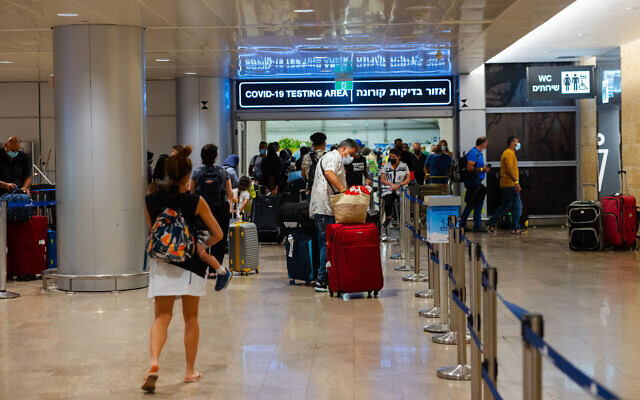Israel Closes Its Borders to U.S. Flights for First Time
Many American Jews feel unwelcome in their Jewish homeland.
American Jews have found it more challenging to be lovers of Zion, or Israel, lately. It’s not because they don’t like Israel. On the contrary, they want to feel welcome there.
First, the Israeli government extended its Nov. 28 ban against non-citizens traveling to Israel until Dec. 29. That angered many Atlanta Jews wanting to travel there to visit family, friends and the country they love. The ban was the Israeli government’s attempt to limit the entrance of more COVID-19 omicron cases into the country. When Eve and David Adler’s planned trip to Israel last month was detoured because non-citizens were not allowed to visit the country, they said they were “thinking of getting Israeli citizenship.”

Days later, the Israeli government for the first time placed the U.S. on its do-not-fly list because nearly 10 percent of arriving passengers from Miami tested positive for COVID-19, many of them with omicron. Many of those infected had attended the Israeli American Council summit in Miami. The U.S. thus joined dozens of countries on Israel’s “red” list from which travel is specifically forbidden, unless special permission is granted. That means even Israelis with American citizenship would need permission to fly to the U.S., and upon return would need to quarantine for at least seven days, even if they are fully vaccinated. The addition of the U.S. to the no-fly list was announced on Dec. 20, effective at midnight the next day. An end date wasn’t named.
American Jews have also felt enormous frustration and rejection since a previous Israeli government, in 2017, froze an historical agreement – reached in 2016 after years of pain-staking negotiations – that supported access and prayer at the Western Wall in Jerusalem to progressive Jews. The majority of American Jews who affiliate with a religious stream do so as Reform, Conservative or Reconstruction Jews. At the time, president of the Union of Reform Judaism, Rabbi Rick Jacobs, said, “North American Jews see this as a betrayal.”
When the current government of Prime Minister Naftali Bennett was sworn in on June 13, 2021, the American Jewish community breathed a sigh of hope. The coalition government did not include any of the ultra-Orthodox parties which had nixed the Western Wall agreement, after approving it a year earlier. Bennett had previously supported the 2016 agreement and several members of his new government announced that they would quickly move to approve the compromise arrangement. This would allow mixed-gender pluralistic prayer areas just south of the traditional, gender-separated prayer space. Just as importantly, the compromise agreement was to allow representatives of the non-Orthodox streams of Judaism joint responsibility for the oversight of the Wall, along with the Orthodox.
In the last few weeks, however, mixed signals emitted from various ministers in the eight-party coalition. As Diaspora Affairs Minister Nachman Shai wrote in a Dec. 17 email to AJT, “It’s quite a complex situation. In short, as Diaspora Affairs Minister, [I am] doing my best to return to the 2016 outline, based on the compromise between the GOI [government of Israel] and the [religious] denominations. Although we have a clear majority in the cabinet, it seems that the strong opposition by Bibi [former prime minister Benjamin Netanyahu] and the Knesset opposition built a public camp made up of the right and the ultra-Orthodox. For the time being, some logistic steps will be done in the present egalitarian pavilion, but the major changes have not been approved yet.”
Shai, who was an Emory University visiting professor for a year and until recently was a board member of the Center for Israel Education in Atlanta, has strong ties with the American Jewish community. He was also a senior vice president and director general of what later became the Jewish Federations of North America.
“My position is to go forward as soon as possible, but without fighting with each other in the Kotel area,” he said, referring to the actual physical attacks by ultra-Orthodox groups against women who tried to pray with a Torah or wear tefillin at the Western Wall, which is believed to be a retaining wall remaining from the Second Temple.

And Israeli newspaper Ha’aretz quoted Foreign Minister Yair Lapid, who is also alternate prime minister, of telling fellow Yesh Atid Party members Dec. 18, “We are pushing very hard for this deal and will not give up on it. But there’s a process, and such processes are sometimes difficult. And there is an attempt being made to turn this into a religion-and-state war in Israel.”
Lapid added that it is “inconceivable that Israel would be the only country in the world without freedom of religion for Jews.”
Perhaps by the time the pandemic eases and the Israeli government permits American Jews into the country, they will also be able to pray at the Western Wall according to their wishes.
- Jan Jaben-Eilon
- Israel
- News
- Israel’s Minister of Religious Services
- Matan Kahana
- Wall agreement
- U.S. Jews
- diaspora affairs minister
- Emory University
- Professor
- Nachman Shai
- religious denominations
- American Jews
- Zion
- Israeli Government
- Travel Ban
- Eve and David Adler
- Non-Citizens
- COVID-19
- omicron
- Israeli citizenship
- United States
- do-not-fly list
- Israeli American Council
- quarantine
- Vaccinated
- Western Wall
- Jerusalem
- progressive Jews
- Reform
- Conservative
- Reconstruction Jews
- Union of Reform Judaism
- Rabbi Rick Jacobs
- North American Jews
- Benjamin Netanyahu
- Prime Minister Naftali Bennett
- American-Jewish community
- ultra-Orthodox
- Center for Israel Education in Atlanta
- Kotel
- Jewish Federations of North America
- Second Temple
- torah
- Tefillin
- Yesh Atid Party




comments